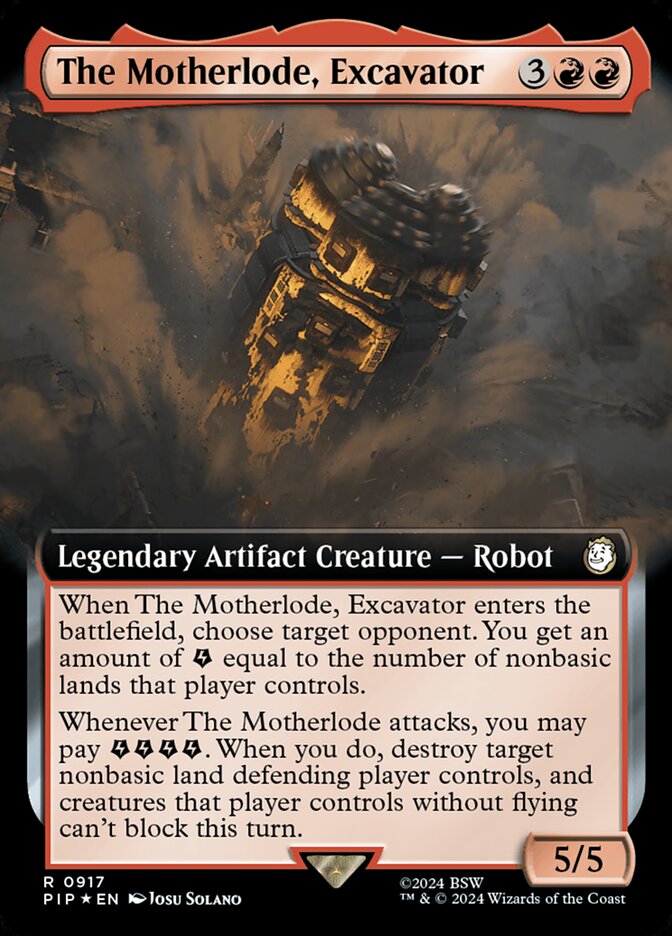
The Motherlode, Excavator {3}{R}{R}
Legendary Artifact Creature — Robot
When The Motherlode, Excavator enters, choose target opponent. You get an amount of {E} (energy counters) equal to the number of nonbasic lands that player controls.
Whenever The Motherlode attacks, you may pay {E}{E}{E}{E}. When you do, destroy target nonbasic land defending player controls, and creatures that player controls without flying can’t block this turn.
5/5
Illustrated by Josu Solano
- Standard
- Not Legal
- Alchemy
- Not Legal
- Pioneer
- Not Legal
- Explorer
- Not Legal
- Modern
- Not Legal
- Historic
- Not Legal
- Legacy
- Legal
- Brawl
- Not Legal
- Vintage
- Legal
- Timeless
- Not Legal
- Commander
- Legal
- Pauper
- Not Legal
- Oathbreaker
- Legal
- Penny
- Not Legal
| Faces, Tokens, & Other Parts |
|---|
| The Motherlode, Excavator, PIP #917 |
| Energy Reserve Card, TPIP #21 |
| Prints | USD | EUR | TIX |
|---|---|---|---|
| Fallout #62 | $0.10 | €0.25 | 0.85 |
| Fallout #389 | $0.32 | 0.45 | |
| Fallout #590 | ✶ $0.96 | ||
| Fallout #917 | ✶ $1.36 | ||
| View all prints → | |||
Toolbox
Buy This Card
Notes and Rules Information for The Motherlode, Excavator:
- Use the number of nonbasic lands the target opponent controls when The Motherlode’s first ability resolves to determine the number of energy counters you get. (2024-03-08)
- You don’t choose a target nonbasic land at the time The Motherlode’s last ability triggers. Rather, a second “reflexive” ability triggers when you pay {E}{E}{E}{E} this way. You choose a target for that ability as it goes on the stack. Each player may respond to this triggered ability as normal. (2024-03-08)
- The Motherlode’s reflexive triggered ability prevents all creatures without flying that player controls from blocking that turn, including creatures that lose flying after the ability resolves as well as creatures without flying that enter the battlefield or come under that player’s control later in the turn. (2024-03-08)
- If the target nonbasic land is an illegal target as The Motherlode’s reflexive triggered ability tries to resolve, it won’t resolve and none of its effects happen. Creatures defending player controls without flying will still be able to block this turn. (2024-03-08)
- {E} is the energy symbol. It represents one energy counter. (2024-03-08)
- Energy counters are a kind of counter that a player may have. They’re not associated with any specific permanents. (2024-03-08)
- Keep track of how many energy counters each player has. Potential ways to track this include writing them down on paper or using dice, but any method that is clear and mutually agreeable is fine. (At higher levels of tournament play, dice may not be allowed for tracking counters that players have.) (2024-03-08)
- If an effect says you get one or more {E}, you get that many energy counters. To pay one or more {E}, you lose that many energy counters. You can’t pay more energy counters than you have. Any effects that interact with counters a player gets, has, or loses can interact with energy counters. (2024-03-08)
- Energy counters aren’t mana. They don’t go away as steps, phases, and turns end, and effects that add mana “of any type” can’t give you energy counters. (2024-03-08)
- Some triggered abilities state that you “may pay” a certain amount of {E}. You can’t pay that amount multiple times to multiply the effect. You simply choose whether or not to pay that amount of {E} as the ability resolves. (2024-03-08)
- Some triggered abilities that state that you “may pay” a certain amount of {E} describe an effect that happens “If you do.” In that case, no player may take actions to try to stop the ability’s effect after you make your choice. If the payment is followed by the phrase “When you do,” then you’ll choose any targets for that reflexive triggered ability and put it on the stack before players can take actions. (2024-03-08)
- If a spell or ability with one or more targets states that you “may pay” some amount of {E}, and each permanent that it targets has become an illegal target, the spell or ability won’t resolve. You can’t pay any {E} even if you want to. (2024-03-08)
- Some spells and abilities that give you {E} may require targets. If each target chosen is an illegal target as that spell or ability tries to resolve, it won’t resolve. You won’t get any {E}. (2024-03-08)